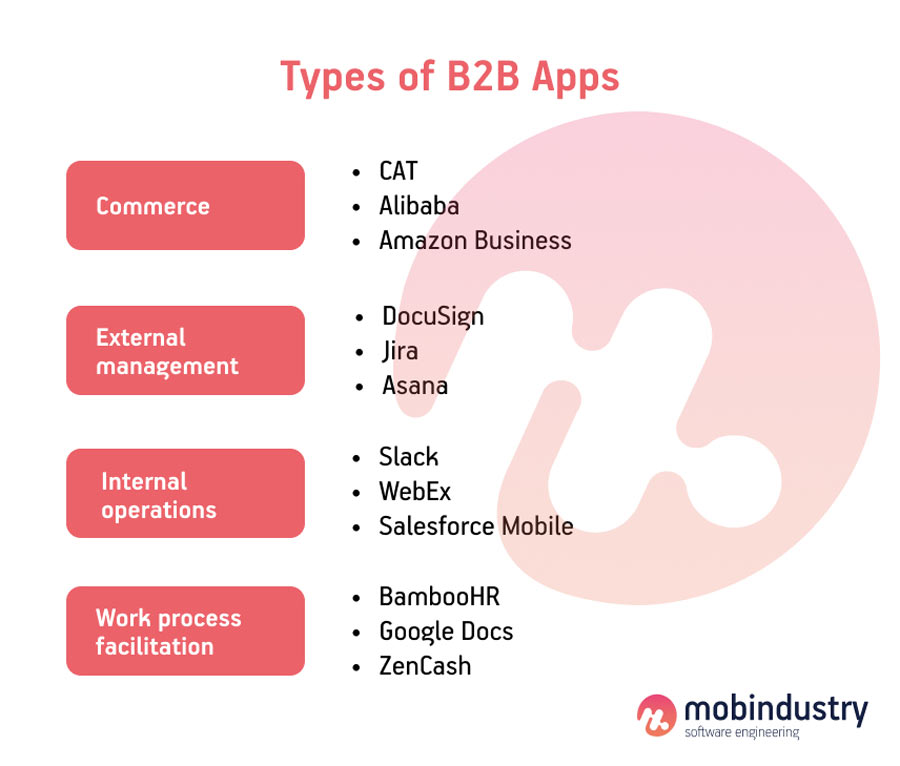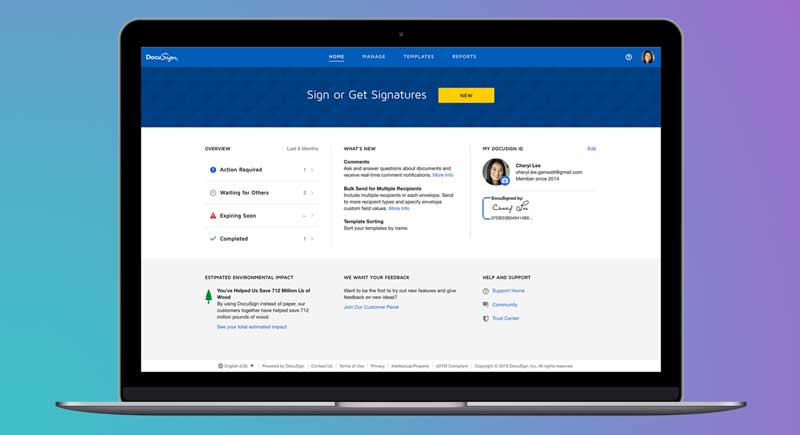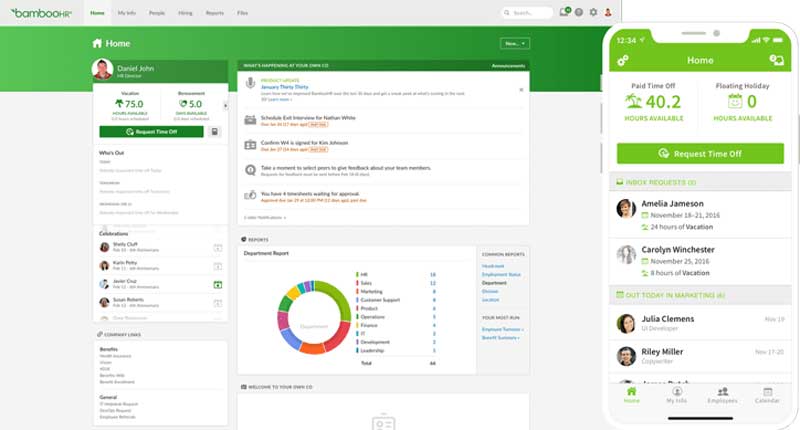How to Develop a Successful B2B Mobile App
The principles of running business-to-business (B2B) and business-to-consumer (B2C) companies are extremely different, and the products that such companies make are also different at their core. Often, B2B businesses need to put much more effort into creating their products, as they’re more complex and involve lots of actors that need to work together like parts of a well-oiled machine.
In this article, I’ll talk about types of B2B mobile software that can help your business grow and the principles of B2B software development. I’ll also talk about the cost to develop an app for a B2B business and how this cost can be returned in terms of additional revenue. Let’s start with an overview of the B2B app market, then talk about the most popular types of mobile apps for B2B businesses.
B2B mobile app market overview
B2B businesses started building mobile apps only recently. In the past, most mobile apps were customer-centric and targeted different consumer audiences.
However, in 2018, the market started to change: businesses discovered that mobile solutions could help them better organize their internal operations, find new partners, provide services to other businesses, and optimize their interactions with all parts of their supply chains. Business to business apps started to gain traction, becoming a multibillion-dollar market of their own. According to Strategy Analytics, the B2B app market is projected to grow to $140 billion by 2023.
Forrester states that 75% of B2B buyers prefer to make purchases by themselves without consulting a B2B salesperson. This is a clear case for B2B commerce and is one of the reasons it’s becoming more and more popular.
What are other reasons for the sudden and rapid growth in the popularity of B2B apps? Here are a few factors that have made this industry so lucrative.
1. Overall popularity of mobile devices
Mobile devices have become an important part of people’s lives, including their work lives. People are used to mobile apps and are willing to use them for work to more easily accomplish tasks. This is especially true for Millennials and younger generations that are used to mobile apps being a part of everything they do.
In 2020, 70% of B2B queries are made on mobile devices
The B2B sector was earlier considered inferior to B2C when it comes to a number of users, but the situation has changed. According to Smart Insights, in 2018, 50% of all B2B queries were made on mobile devices, and they expect that percentage to grow to 70% by the end of 2020.
2. A need for process optimization
Businesses feel the ever-increasing competition, and whoever does their job faster wins. Process optimization is something mobile software can help with: constant communication, anywhere access to documents, and operating on the fly allows businesses to improve their services and get ahead of the competition.
3. Real-time data collection
A data-driven business approach has proved the most effective, and mobile apps help businesses gather, organize, and process data to deliver useful insights to business owners about partners, clients, and employees. Businesses now integrate apps into their existing CRMs and other internal systems.
These are only some of the benefits of B2B apps for enterprises, and we’ll talk about them in more detail later. Let’s now look at where B2B apps are most useful, how a B2B app can help your business, and how you can build a B2B product that will help other businesses thrive.
Types of B2B apps
There are several categories of B2B apps, which can be divided according to their goals or the tasks they accomplish.
- Commerce
- External management
- Internal operations
- Work process facilitation

Let’s talk about them in more detail and look at the best B2B app examples.
Commerce
Just like B2C mcommerce products, business to business ecommerce apps are created to sell products to customers, only those customers are other businesses. While previously businesses sent their partners large Excel spreadsheets with products and prices, then engaged in tiresome email exchanges to take and process orders, businesses now understand the importance of providing their partners with the same level of service B2C ecommerce apps provide.
This level of service is made possible by:
- Product listings
- Category trees
- Convenient navigation
- Push notifications
- Delivery statuses
- Easy checkout and payments
- Order management
- The ability to order additional services
CAT provides one example of a B2B commerce app.

CAT is an equipment company that offers an application with which businesses can monitor, manage, and request the support for their CAT equipment. Their app has GPS functionality that allows customers to track their CAT equipment in real time as well as check their fuel levels, technical conditions, and engine hours.
The CAT app sends notifications that help businesses avoid critical situations and delays, and it also connects customers to official CAT dealers if technical support is needed.
In addition, the CAT application has a listing of equipment and parts that customers can order. This makes CAT one of the best apps for B2B sales.
Another example of an ecommerce B2B application is of course Alibaba – the largest B2B ecommerce platform in the world.

Alibaba is a marketplace that offers millions of products, from home appliances to heavy machinery and equipment.
External management
External management software for B2B businesses helps to coordinate vendors, manage supply chains, and facilitate communication between different actors. These tools include CRMs, project management apps, and online conferencing apps.
DocuSign is an example of an external management application.

DocuSign helps users manage and sign documents online, reducing paperwork and the time needed for decision-making. DocuSign integrates with different file management or document editing tools such as Google Docs. Apart from allowing users to upload, sign, and send documents, DocuSign also offers document analytics.
Jira is one of the top B2B apps that helps users manage projects, plan deadlines, assign tasks, and track their progress. Jira can also be used as an internal management tool. But often, Jira is used to coordinate the work of vendors and an in-house team, distribute tasks and so on.

For example, at Mobindustry, we use Jira to communicate with our clients and allow them to keep track of their projects.
Internal operations
Applications for internal operations help businesses manage their internal processes and operations and facilitate communication between departments and employees. There are lots of products for internal operations, including corporate messengers, CRMs, finance management tools and so on.

Slack is one example of a B2B product for internal operations. This popular corporate messenger allows employees to communicate and exchange files. Slack is a tool for teamwork that allows users to create topics, projects, and so on for convenient and organized communication.
Work process facilitation
In this category are all the tools your employees can use to make their jobs easier and more productive. For each business, the set of relevant tools will be different. For example, warehouse workers can use software for inventory management and delivery workers can use an app to locate delivery addresses and change delivery statuses on the go.
Human resource managers also have their own software for employee management that helps them keep track of employees and manage their qualifications.

Office workers often use products from Google or Microsoft to facilitate their work, and many large companies choose to create their own software for facilitating internal work processes.
Now let’s see what’s important for B2B applications and how a B2B app is different from a B2C app in terms of challenges, benefits, and development approaches.
B2B vs B2C app comparison
B2C applications have reigned in the mobile market for a long time. That’s why when you start to build a B2B app, it’s important to understand the differences and make sure you don’t take a B2C app as an example for your B2B app.
That said, business to business software does have some things to learn from B2C apps, such as a focus on the user experience and user interface. These are things that many B2B businesses still neglect.
What are the key differences between B2B and B2C apps?
1. Focus
The focus is the first thing you need to think about when you start development. B2C products are very different from business to business apps in this respect. While B2C apps are focused on downloads and market share, the B2B mobile app strategy should be about earning the user loyalty.
You’ll rarely see B2B products on the top 100 app chart on markets. They typically have way fewer downloads than B2C applications, and that’s okay. The main thing is the user lifetime value, and the focus of each B2B app should be on keeping existing clients over attracting new ones.
Surely, building B2B app marketing strategies and brand awareness is also important, but they should emphasize how many new users actually stay on the platform, as this is the biggest predictor of revenue and future growth.
2. Success factors
What helps a B2C product attract new users and be successful? Prices that are lower than the market average help applications gain a new audience. Also, it’s a challenge to get users of B2C apps to pay, as free products flood the market. Constant updates and new features are what help B2C apps keep users.
For business to business products, however, success is dictated by two factors: added value and an optimized experience. B2B apps typically don’t offer lower prices to attract businesses, as businesses often don’t care about that price difference: the priority is to get a product that will make their work significantly easier.
Added value to business and optimized experience are two main success factors for B2B applications
A B2B app should put extra effort into the user experience and how it corresponds to the business goals of target clients.
3. Challenges
B2B and B2C apps also have different problems. For B2C apps, it’s often a challenge to keep existing users because of competition. According to BusinessofApps, users spend 95% of their time in their top 10 apps and delete most applications after they install them without ever opening them.
Another challenge is achieving quick traction, without which you may get no downloads at all and drown in the ocean of competitors’ applications.
For B2B applications, the challenge is much higher standards. No B2B entrepreneur will be able to create an MVP in one month and quickly release it to the Apple and Android app markets. B2B products are often large and complex, so they need significant investments at the very start.
Another big challenge is to get the first users. The B2B application development market is less dynamic than the B2C market, and businesses find it difficult to shift to other products when they already have something that works with their system.
4. Points of growth
Both B2B and B2C mobile products also have their advantages. For example, it’s faster to launch B2C apps because the bar for entry is lower. Getting downloads and getting the first users is also easier.
B2B applications, on the other hand, have more prospects in terms of stable revenue: the size and frequency of purchases is usually much higher despite the fewer users.
How to build a successful B2B app: industry standards
1. B2C experience
According to SwiftCloud, 8 out of 10 business consumers expect a great user experience from a B2B application. This means they want an app with a good visual and user experience design. According to 45% of respondents to a SwiftCloud survey, most B2B apps fall short when it comes to the user experience.
If you want to stand out from the crowd, pay close attention to your app’s UI and UX design. The business analysis stage is absolutely necessary, as it will allow you to think through your features and make sure you use mobile device capabilities to their fullest potential.
2. Real-time interactions
Your mobile product should be able to update information in real time, and if your software is present on different platforms — for example, web and mobile — the data must be updated on every platform through a shared database.
To implement this omnichannel experience, you need to choose a fast and reliable database. We usually recommend MongoDB, as it’s one of the fastest databases out there.
3. Instant support
Businesses can lose thousands or even millions of dollars in revenue when the software they depend on stops working. You should be able to provide instant support to your customers, and your product can help with that. Set up a convenient admin panel that will allow your support team to provide help efficiently. Another thing you can do is develop a chatbot that will be able to reply instantly at any time. This support automation will allow your business to answer generic questions while leaving more complex issues to your live support team.
When you plan the development, make sure that your B2B app development agency takes a B2C approach when it comes to user experience, and develop the B2B app features that use mobile capabilities to their fullest potential.
Cost of B2B app development
B2B applications are typically more expensive to develop than B2C applications, because B2B apps are often more complex and have higer security and performance standards than B2C apps. The cost of a B2B application depends on multiple factors like:
- Scope of work
- Complexity and number of the features
- Team size
- Cost of third-party integrations
- Cost of licencing
- Complexity of design
- Your development team’s hourly rates
Hourly rates play the biggest role in the final cost of any software. For example, the cost of development in the US can be up to 5x higher than in Ukraine, while the quality will be the same. That’s why many businesses choose to outsource their B2B app development and save money for future marketing and other expenses.
It’s hard to say how much your B2B app will cost without knowing all the details, so I recommend you to contact several app development companies and ask them for a quote. After an interview, they will be able to give you a rough estimate. A detailed estimate for your B2B project is possible to calculate only after a discovery phase.
Final thoughts
The B2B app market has a much higher bar for entry, so most B2B applications require more development time than B2C applications. The biggest challenge with a B2B mobile app is getting the first users. However, once your app gets traction, it will bring more revenue and more frequent orders than its B2C counterparts.
How can you make users stay and become regular customers? Security, a good architecture, and reliability are important, but most of your potential customers expect more than that.
You need to pay extra attention to B2B mobile app trends that include focus on user experience. Also, make sure your application tackles business issues on the spot.
Security, reliability and usability are three most important factors in B2B app development
If you plan to create a B2B application, we can assist you at any step of your B2B mobile app development journey, from creating a technical specification and building a convenient user experience to establishing a database and developing the app itself.
We specialize in B2B web application development as well as mobile app development for enterprises. We create custom B2B apps for large businesses in domains like ecommerce, healthcare, insurance, logistics and more.
Feel free to contact us: we’re able to extract your business to business app ideas and translate them into a reliable and effective product.
Frequently Asked Questions
To build a successful B2B application, you need to:
- Study the market and find your niche
- Perform competitior and target audience research
- Assess your budget
- Plan your marketing campaign, find first potential users
- Find a reliable development team
- Create a technical specification and get a detailed estimate of your project
- Develop and release an MVP
- Analyze your user feedback and change the app according to their needs
The cost of developing your B2B app depends on a multitude of factors like:
- Sope of work
- Complexity and number of the features
- Team size
- Cost of third-party integrations
- Cost of licencing
- Complexity of design
- Your development team's hourly rates
Only after creating a technical specification your developers can accurately estimate the cost of your application. A typical B2B app cost starts from $35.000



